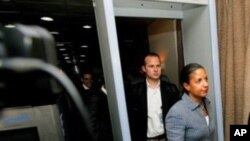The United Nations Security Council has cancelled a visit to Sudan’s disputed Abyei region after government forces launched an offensive, capturing a main town.
UN officers briefing diplomats and journalists Saturday said northern Sudanese forces had taken control of the town of Abyei after a day of heavy shelling. Spokeswoman Hua Jiang said staff at the UN compound had taken shelter in bunkers at the height of the attack, but that shelling had died down by evening.
A Security Council ambassador said the incident appears to be timed to discourage the Council from a visit to Abyei scheduled for Monday. The trip has been cancelled.
The visiting delegation is planning to raise the issue during meetings with senior officials Khartoum, including Vice-President Ali Osman Taha. They will Monday travel to the southern Sudanese capital, Juba where they will hold talks with President Salva Kiir.
The Security Council delegation flew to Khartoum late Saturday after a day-long debate at African Union headquarters, mainly covering conflicts in Sudan and Libya. A senior Council ambassador described the six-hour closed-door session as tense.
Diplomats attending the meeting say the UN delegation was forced onto the defensive by African representatives angry at implementation of the Security Council resolution authorizing NATO air strikes IN LIBYA. African ambassadors were said to have criticized the Security Council’s contention that the purpose of the NATO action was the protection of civilians.
Briefing reporters after the meeting, AU Peace and Security Commissioner Ramtane Lamamra said civilians might have been better protected by a proposed African solution calling for a ceasefire and a negotiated settlement brokered by a panel of AU heads of state. "Protecting civilians is certainly a shared concern. We believe the ad hoc committee of the heads of state has a comparative advantage on this issue," he said.
The Khartoum government and its autonomous southern region have been unable to agree on which side should control the oil-rich Abyei region as the south prepares to secede on July 9.
Northern and Southern armies had earlier agreed to conduct joint patrols in Abyei. But fighting erupted in the region Thursday, when a northern army convoy accompanied by U.N. peacekeepers came under attack. Each side accused the other of firing first.
Lamamra said while the UN Charter clearly gives the Security Council authority to act in cases such as Libya, as it did earlier in Sudan’s Darfur region, organizations like the African Union are better placed to settle regional conflicts. "According to the UN Charter there is primacy of the UN Security Council, but in the real world of ours you need to seek the guidance of the regional organization, which by virtue of culture, history, geographic proximity, is better prepared to make headway," he said.
A communiqué issued after the meeting glossed over the deep divisions between the two bodies evident during the closed-door session. The communiqué expressed deep concern over the continuation of violence in Libya. It expressed similar concern over the increasing troubles in Abyei.
Despite the behind-closed-doors wrangling, diplomats say the relationship between the two security bodies has grown stronger in the three years since they began annual joint meetings. This year the final communiqué dealt with substantive issues such as Libya and Sudan, rather than the brief general statements made after previous meetings.
But hopes by African diplomats for more equal footing with the UN body seem distant. When asked if the two Councils might be inching closer to a greater equality, a senior Security Council diplomat answered with a single word. No.
UN Security Council Cancels Visit to Sudan’s Abyei Region, Citing Violence




